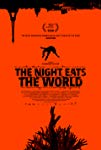Eye For Film >> Movies >> The Night Eats The World (2018) Film Review
The Night Eats The World
Reviewed by: Jennie Kermode

There's a strain in mid-20th Century apocalyptic fiction that has been sorely neglected in the 21st Century, with fascinating connotations. Even the 2007 take on I Am Legend ultimately promised its protagonist company. Is it getting harder, in our increasingly interconnected world, to imagine isolation - or just more frightening? The Night Eats The World is a zombie movie, but only in the sense that it has zombies in it. The real horror it's concerned with has very little to do with them.
Sam (Anders Danielsen Lie) has already been dealing with loneliness. We see it etched into his face when he returns to the Paris apartment that used to be his home to pick up a box of old tapes. There's a party going on there and his ex is arm in arm with her new beau. Though things are evidently amicable, it's only reluctantly that he lets himself be persuaded to stay. Drinking heavily seems to be the best way to cope. And then suddenly it's morning, bright light streaming through the windows, and the walls of the flat are covered in blood, and he's alone.
We all like to think that we'd be bold warriors if faced with a zombie apocalypse, but let's face it, when a stranger actually runs at you with murderous intent, it's really scary. Sam isn't stupid; he succeeds in fending off one or two of the undead but he has no intention of going out into the streets where he could have to deal with dozens at a time. So he painstakingly secures the building, sets up the basics of what he needs to survive, and waits. For what is unclear. There's no suggestion of impending rescue, no sign of any other living, uninfected person around. Perhaps this relationship with the building is the only real connection he has left. As monstrous remnants of humanity stagger through the streets outside, he diligently cleans blood out of the floorboards.
Zombie movies are often frustrating because of the stupidity of their characters. There's little of that here. Sam is as efficient in establishing the mechanics of his survival as director Dominique Rocher is in expanding beyond the immediate narrative to give us glimpses of more complex human stories, something that again puts the emphasis on interconnectedness. Expanding on the notion of loneliness and the importance of familiar places in our lives, he brings in themes about emotional dependency, possessiveness and the ways we define our identities in relation to others. When Sam takes a risk to try to reach a kitten it doesn't feel stupid. We connect with his need. (The kitten, of course, has an identity and concerns of its own.)
There's a powerful supporting performance by Golshifteh Farahani, whom few in the profession can match in terms of the amount of history and complex emotion she can convey in just a few brief scenes. There's also Denis Lavant in the semi-comical yet poignant role of a zombie trapped in the building's lift, physically deteriorating and mentally vacant yet the closest thing Sam has to a friend. His vacant observation mirrors Sam's own, looking out of the window, watching without interacting just as, from the start of that party, he is watching his previous life from a distance. Yet this distancing never makes the film dull. Instead we get the sense of something building, and a change in Sam like the change in the world that will eventually force him to act.
A thoughtful film that dares to go to neglected places, The Night Eats The World is timely and haunting and a reminder of what this subgenre is for.
Reviewed on: 10 Jul 2018















